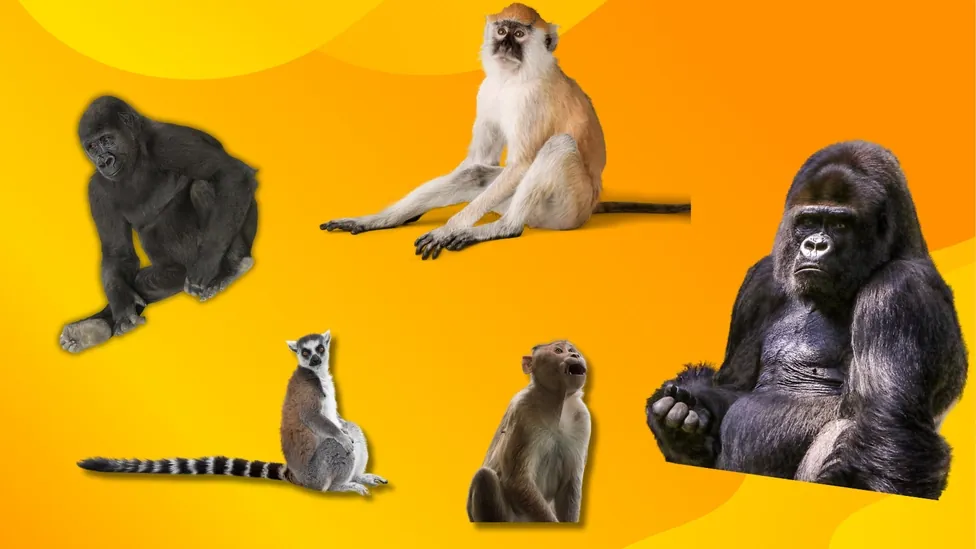Whole genome sequencing of 233 primate species unravels the wonderful diversity among primates

Highlights
- Primates are a group of mammals with advanced cognitive abilities, grasping hands and feet, forward-facing eyes, and complex social behaviour.
- Primate research informs human physiology, health, and disease, as humans also belong to the primate order.
- Previous studies on nonhuman primate genomes were limited and lacked diversity, hindering our understanding of genome variability.
- A new study sequenced the genomes of over 800 individuals from 233 primate species, providing new insights into genetic diversity and the primate family tree.
- The study identified 4.3 million missense mutations associated with human diseases, shedding light on the genetic causes of common ailments.
- An AI algorithm helped analyse the primate genomes and revealed that some missense mutations are more abundant in primates than in humans.
- The diverse primate genomic catalogue allows for the discovery of unique mutations specific to humans, offering insights into our distinctive features and evolutionary traits.
Primates are a group of mammals characterised by their advanced cognitive abilities, grasping hands and feet, forward-facing eyes, and complex social behaviour. Popular primates include us humans, apes, monkeys, lemurs, and tarsiers. Primates are known for their diverse morphological features and exhibit a wide range of behaviours, making them an intriguing subject of study in various fields such as biology, anthropology, and evolutionary science.
As humans also belong to the order Primates, primate research informs human physiology, health and disease. Scientists have been studying nonhuman primate genomes to learn about human evolutionary origins, human health, and disease. However, previous studies focused on only a few species, like great apes or macaques, which gave limited insights into genome variability. Additionally, these studies included a small number of wild-born individuals, which may not accurately represent natural populations.
To fully understand how evolution has influenced genomic variation in primates, researchers realised the need to sequence the genomes of many primate species and individuals. This would also include lineages that have been overlooked in the past, such as lemurs, lorises, galagos, and other primates.
Whole-genome analyses of 233 primate species
A new study published the genome sequencing of over 800 individuals from 233 primate species, covering nearly half of all existing primate species on Earth 1. This study gives us new information about the genetic diversity and family tree of primates. It’s important because it helps us understand different species that are most similar to humans. Additionally, this study will supplement biodiversity conservation efforts as these primates inhabit diverse regions of the Earth.
The study’s genomic analyses have identified 4.3 million common missense mutations leading to many human diseases.
Human and clinical genetics have a limitation: they cannot currently identify the specific mutations that cause diseases from a vast number of mutations. We still don’t know the genetic causes of many common diseases like diabetes and heart disease, either because we lack genetic information or because numerous genetic factors are involved. It is believed that certain diseases develop when multiple genetic variations or mutations with a “mild” impact work together, resulting in a polygenic disease like diabetes or cancer.
AI helped analyse sequence of primate genomes
The researchers used a deep learning artificial intelligence (AI) algorithm developed by a private company to analyse the sequences of the primate genomes. This algorithm helped the researchers to discover that 6% of the 4.3 million missense mutations identified are abundant in primates compared to humans. This means that they are under-represented in humans. The elevated presence of missense mutations in primates means they tolerate these mutations better than humans.
The analysis also revealed an interesting insight into the family tree (phylogeny) of primates. Genome sequences showed that relationships among primate species are complex and network-like rather than simple branching trees.
Primate diversity
This study presents the whole genome sequences of 233 primate species making it a comprehensive catalogue of nearly half of the primate species on Earth. These species represent the wonderful diversity of primates from across Asia, Africa and the Americas.
Lead author of the study, Tomàs Marquès-Bonet said, in a press release, “Humans are primates. The study of hundreds of nonhuman primate genomes, given their phylogenetic position, is very valuable for human evolutionary studies, to better understand the human genome and the bases of our singularity, including the bases of human diseases, and for their future conservation”.
The diverse primate genomic catalogue has enabled the discovery of a number of genomic features that were previously thought to exist only in humans. This finding is crucial because it helps us identify mutations that are specific to humans and not found in other primates. These unique mutations may hold the key to understanding the distinctive features and evolutionary traits that make us human. By narrowing down the number of genomic innovations exclusive to humans, researchers can focus their investigations on these specific mutations and gain valuable insights into the genetic factors that contribute to our human characteristics. This discovery opens up new possibilities for studying human evolution and unravelling the genetic basis of what sets us apart from other species.
References
- Lukas F. K. Kuderna et al., A global catalog of whole-genome diversity from 233 primate species. Science. 380, 906-913 (2023).
